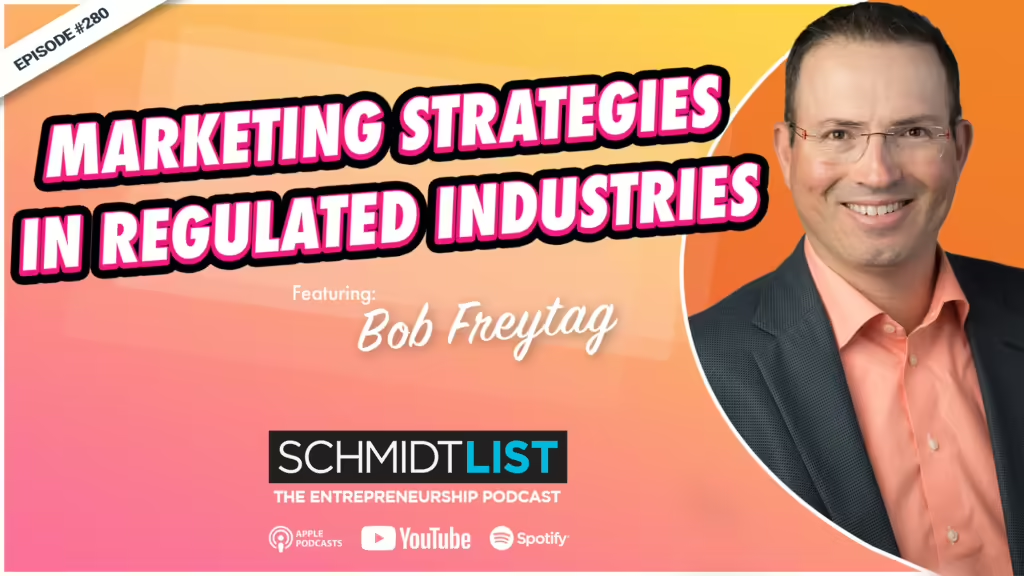Marketing in highly regulated industries like Medtech, health tech, and fintech is no small feat. Recently, Bob Freytag, a seasoned marketing professional and guest on the Schmidt List podcast, shared his wisdom on effective marketing strategies in these complex sectors.
Here’s a deep dive into the conversation, exploring key takeaways and insights on creating compelling marketing narratives in regulated environments.
Conducting In-Depth Research: The Foundation of Effective Marketing
Bob Freytag’s approach to marketing begins with thorough individual interviews and secondary research. This dual-method strategy provides a comprehensive understanding of the company, products, competitors, and, most importantly, the customer’s mindset.
“Getting to know the customer deeply and personally helps form a robust foundation for any marketing strategy,” Bob mentions. By combining primary and secondary research, marketers can unearth valuable insights that shape the narrative and set the stage for impactful messaging.
Crafting Strategic Narratives through Exploration Meetings
Once the data is collected, the next step involves exploration meetings. These are brainstorming sessions where insights are discussed and strategic narratives are crafted. The objective is to develop a handful of high-level positioning messages.
“The goal is to narrow down our insights into meaningful, differentiated, and deliverable messages,” Bob explains. This rigorous process ensures the messages resonate with the target audience and highlight the unique value proposition.
Market Testing: Letting the Audience Dictate the Message
Market testing is one of the most critical stages in Bob’s marketing process. Here, potential messages are ground-tested with the target market to gather feedback.
“It’s vital that the market dictates the final message,” Bob asserts. This approach ensures that the messaging is not just an internal consensus but validated by the audience. This external validation can make or break a campaign’s success.
Sales Support: Equipping Reps for Success
Sales support is another cornerstone of effective marketing, especially for smaller companies working with independent distributors. Bob emphasizes the importance of preparing sales reps with the right tools and messaging.
“Clear, consistent messaging and supportive tools ensure the sales reps can effectively communicate with potential clients,” Bob notes. This alignment between marketing and sales is crucial for seamless execution and achieving business objectives.
Authenticity in Branding: Aligning Message with Experience
Kurt Schmidt and Bob Freytag delve into the importance of authenticity in branding. Consistent, genuine messaging that aligns with the customer experience is essential.
“A brand is defined by what customers say, not by what the company declares,” Bob highlights. This underscores the need for brands to listen to their customers and ensure their marketing message aligns with the customer experience.
Educating Clients: The Role of Market Feedback
Educating clients about the importance of market feedback is a recurring theme in Bob’s work. Many clients, especially new to this structured process, need to understand why market feedback is essential for shaping the brand’s message.
“Clients must realize that internal opinions alone can’t dictate market success; the audience’s voice carries significant weight,” Bob explains. This education is vital for forming strong partnerships and ensuring successful outcomes.
The Trueview Tool: Bridging Market Perceptions and Messaging
To assist in this process, Introworks developed a tool called Trueview, which focuses on understanding market perceptions of a company, including brand and competitive analysis.
“Trueview allows clients to track brand progression and market changes annually,” Bob shares. This tool ensures that market perceptions align with the company’s messaging, providing a dynamic approach to branding and marketing.
Continuous Learning and Adaptability: Essential for Success
In the fast-paced world of marketing, continuous learning and adaptability are non-negotiable. Bob emphasizes working with companies and leaders who prioritize these values.
“Effective partnerships stem from a shared commitment to learning and evolving,” Bob notes. This philosophy ensures that marketing strategies remain relevant and impactful even as market dynamics shift.
Final Thoughts: Collaboration and Genuine Engagement
The conversation concludes with a vital insight: successful marketing initiatives hinge on collaboration and genuine engagement with the audience.
“Marketing should be driven by a genuine understanding and responsiveness to the audience,” Bob advises. Avoid ego-driven approaches and focus on engaging the audience meaningfully, showcasing a deep understanding of their needs and preferences.
Marketing in regulated industries may be challenging, but with strategic research, authentic messaging, continuous learning, and a strong emphasis on market feedback, creating impactful and successful marketing campaigns is possible.
For more insights from Bob Freytag and the team at Introworks, visit their website (http://intro.works) and subscribe to their quarterly newsletter, “The Catalyst.”
You can also connect with Bob Freytag on LinkedIn or reach out via email at bfreytag@intro.works.
*Stay tuned to the Schmidt List podcast for more expert discussions and practical tips on navigating the complexities of modern marketing.*
